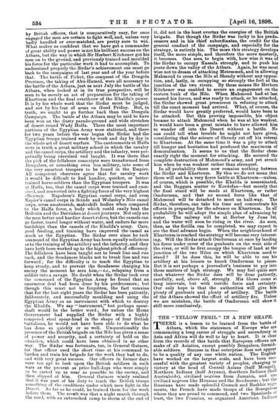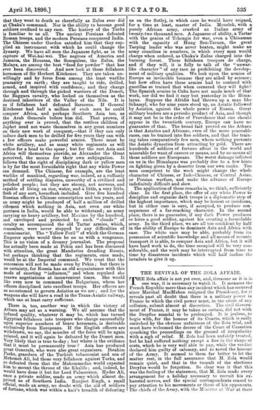THE "YELLOW PERIL " IN A NEW SHAPE. T HERE is
a lesson to be learned from the battle of Atbara, which the statesmen of Europe who are commencing a long career of struggle and ascendency in Asia and Africa will do well to lay to heart. It is clear from the records of this battle that European officers can make of all Asiatics, except possibly Bengalees, formid- able soldiers. Success in that enterprise does not appear to be a quality of any one white nation. The English have worked on the largest scale, and have been suc- cessful with the greatest variety of peoples, charging to victory at the head of Central Asians (half Mongol). Northern Indians (half Aryans), Southern Indians (half Australoids), civilised negroes from Jamaica, and un- civilised negroes like Houssas and the Soudanese ; but the Russians have made splendid Cossack and Bashkir regi- ments, the French have made troops of the Senegalese whom they are proud to command, and two Spaniards at least, the two Francias, so organised American Indians that they went to death as cheerfully as Zulus ever did at Chaka's command. Nor is the ability to become good soldiers confined to any race. The history of the Turks is familiar to us all. The ancient Persians defeated Roman troops, and the modern Persians conquered India. The Chinese under Gordon satisfied him that they sup- plied an instrument with which he could change the dynasty. We have all seen the Japanese fight, as in the capture of Wei-hai-wei. The negroes of America and Jamaica, the Houssas, the Senegalese, the Zulus, the Malays, are among the best " food for powder " that has ever been discovered. And now look at these fellaheen horsemen of Sir Herbert Kitchener. They are taken un- willingly and by force from among the least warlike peasantry on earth ; they are taught to ride, drilled, armed, and inspired with confidence.; and they charge through and through the picked warriors of the Desert, the Baggara cavalry, who looked on themselves as the destined inheritors of the Valley of the Nile. It is as if fellaheen had defeated Saracens. If General Kitchener had half a million of such men he could conquer Africa, and perhaps Southern Asia too, as the Arab Generals before him did. That proves, if anything ever is proved, that the restless children of Japhet need not waste themselves in any great numbers on their new work of conquest,—that if they can only induce dark men to be drilled for five years they can with a few officers make powerful armies. There must be white artillery, and as many white regiments as will suffice for a head to the spear ; but for the rest Asia and Africa will themselves provide, as Alexander the Great perceived, the means for their own subjugation. It follows that the right of disciplining dark or yellow men is by far the most formidable right that any white Power can demand. The Chinese, for example, are the least warlike of mankind, regarding war, indeed, as a ruffianly method of settling disputes, unworthy of a civilised and polished people ; but they are strong, not nervous, and capable of living on rice, water, and a little, a very little, flesh of any sort, horseflesh included. Give five hundred Russian officers a Chinese conscription and ten years, and an army might be produced of half a million of drilled riflemen which nothing in Asia, not even our white garrison in India, would be able to withstand; an army carrying no heavy artillery, but Maxims by the hundred, and enveloped and protected by such " clouds " of cavalry as accompanied the old Tartar armies, which, remember, were never stopped by any difficulties of commissariat. The "Yellow Peril" of which the German Emperor spoke would then be on us with a vengeance. This is no vision of a dreamy journalist. The proposal has actually been made at Pekin and has been discussed with attention, the great Mandarins dreading Russia, but perhaps thinking that the regiments, once made, would be at the Imperial command. We trust that the concession will not be made even by Pekin ; but there is no certainty, for Russia has an old acquaintance with this mode of exerting "influence," and when repulsed she renews negotiations at inconvenient times. She would like even now to command the Bulgarians, whom her officers disciplined into excellent troops. Her officers are as accustomed to govern Asiatics as we are ; and for the weapons she will have a road in the Trans-Asiatic railway, which can at least carry sufficient.
There is, too, another way in which the victory of A. tbara may act as a warning. We all assume that the infused quality, whatever it may be, which has turned Egyptian fellaheen into troopers who charge successfully upon superior numbers of brave horsemen, is derivable exclusively from Europeans. If the English officers are withdrawn, we say, the muscles of the force will be again relaxed, and it will again be defeated by the Desert men. Very likely that is true to-day ; but where is the evidence i that it must be permanently true ? Asia has produced great Generals, who were also great organisers. Ibrahim Pasha, grandson of the Turkish tobacconist and son of Mehemet Ali, led these very fellaheen against Turks, and so defeated them that the Mahommedan world expected bun to mount the throne of the Khalifs ; and, indeed, he would have done it but for Lord Palmerston. Ryder Ali, once a private soldier, made an army which almost de- pnved us of Southern India. Runjeet Singh, a small official, made an army, no doubt with the aid of soldiers of fortune, which was within a hair's breadth of defeating us on the Sutlej, in which case he would have reigned, for a time at least, master of India. Menelek, with a, purely African army, crushed an Italian army of twenty-two thousand men. A Japanese of ability, a Tartar with the genius of Tchengis for war, even a Chinaman with the capacity of Hung Seu-Tseuen, the great Taeping leader who was never beaten, might make an army countless in numbers, in which every man would charge when ordered, as Chaka's Zulus charged into the burning forest. These fellaheen troopers do charge, and if they will, it is folly to talk of the " unwar- like character " of any race as prohibiting the develop- ment of military qualities. We look upon the armies of Europe as invincible because they are aided by science ; but how often have these armies had to contend with guerillas so trained that when cornered they will fight? The Spanish armies in Cuba have not made much of that work, nor did we find it easy but yesterday in the Hima- layas. Suppose the Afridis had thrown up a man like Schamyl, who for nine years stood up, an Asiatic followed by Asiatics, against the whole power of Russia. Great military leaders are a periodic product of Asia, and though it may not be in the order of Providence that one should appear in the twentieth century, Europe can have no guarantee of that. The broad fact proved on the Atbara is that Asiatics and Africans, even of the more peaceable races, can be trained into fine soldiers, and that the train- ing takes comparatively few men, whom nothing prevents the Asiatic dynasties from attracting by gold. There are hundreds of soldiers of fortune afloat in the world and miserable for want of careers or means, and by no means all these soldiers are Europeans. The worst damage inflicted on us in the Himalayas was probably due to a few hints on fighting given by a deserter from our own ranks. Ten men competent to the work might change the whole character of Chinese, or Indo-Chinese, or Central Asian, or Persian warfare, and make the advance of Europe indefinitely difficult and slow. The application of these remarks is, we think, sufficiently clear. In the first place, the offer of any white Power to discipline and organise dark troops is a diplomatic step of the highest importance, which may be honest or insidious, but in either case is sure, if accepted, to produce con- sequences of a far-reaching character. In the second place, there is no guarantee, if any dark Power produces or hires a good soldier, against his creating a formidable army. In the third place, we are all too confident by half in the ability of Europe to dominate Asia and Africa with ease. The white race may be able, probably from its possession of scientific knowledge and all means of oceanic transport it is able, to conquer Asia and Africa, but it will have hard work to do, the time occupied will be very con- siderable, and the work may be interrupted from time to time by disastrous incidents which will half incline the invaders to give it up.



































 Previous page
Previous page